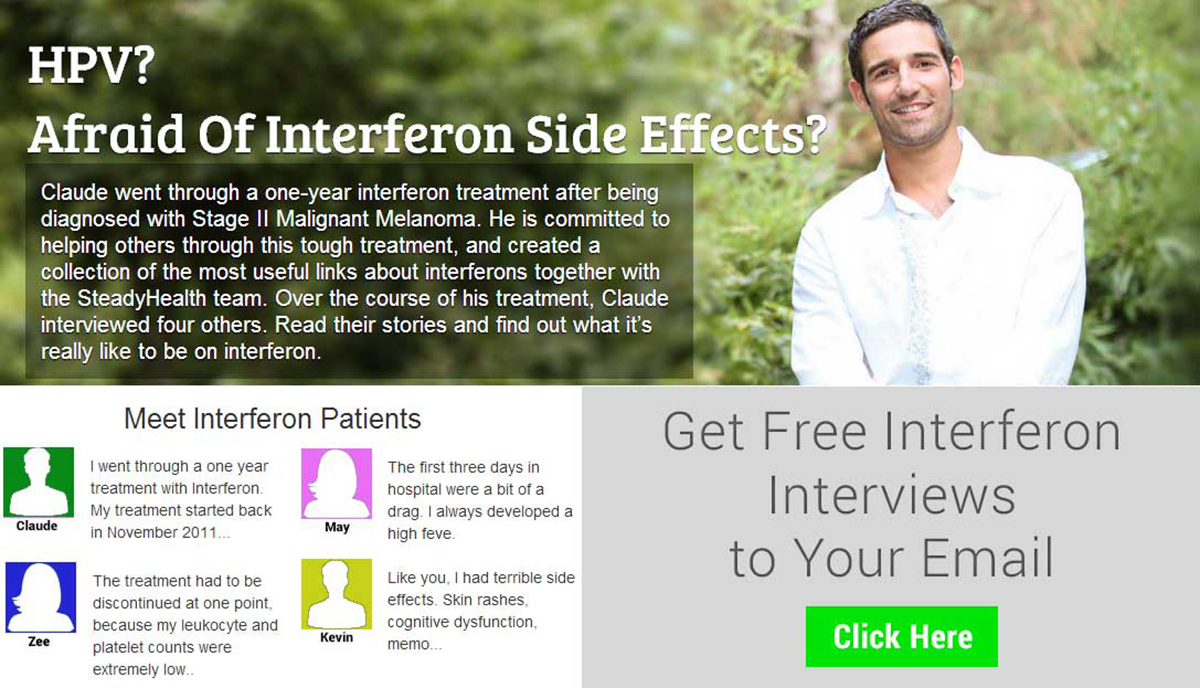Table of Contents
Just like other drugs, interferons have side effects. Naturally produced interferons are responsible for the flu-like symptoms people experience when they have a viral infection. The natural immune system response of the body triggers the production of interferons, which fight invading viruses, resulting in headache, fever, chills, muscle aches, fatigue, and other bodily symptoms. These are the same symptoms one may experience when given interferons to treat disease. Patients may experience various degrees of discomfort – some may have mild symptoms while others may feel debilitated. In most cases people recover from these symptoms as treatment progresses. Symptoms may be relieved by taking acetaminophen or ibuprofen before and after treatments.
Interferon treatment may affect liver and thyroid functions. Some patients are found to have a temporary decrease in white blood cell count or a decrease in platelets, the blood component that helps in clotting. Doctors must therefore monitor their patients for changes in laboratory findings during interferon therapy.
Side effects may also depend on the dosages used, which will also be affected by the number of warts treated per session. To avoid severe side effects such as rashes, nausea, vomiting, diarrhea, numbness, and low blood pressure (hypotension), doctors must limit the number of warts treated during one session and treat the rest of the warts in other treatment sessions.
Treatment Options
There are a few things to consider in the treatment of HPV infection. First, it has been mentioned that HPV is usually a mild infection that can heal on its own. Therefore, doctors and patients must discuss the benefits and side effects of treatment, which could affect the decision to start therapy. Another point to consider is that there is no cure for HPV and that the virus can still be passed on even when warts have been removed. It is therefore necessary to practice safe sex or no sex at all to prevent the spread of the disease.
As for the choice of treatment, research shows that there is not one type of treatment that is completely effective in treating HPV. Treatments may be combined to increase their effectiveness.
Some patients must avoid receiving interferon treatments and they include pregnant women, patients with autoimmune disease, renal disease, cardiovascular disease, peripheral neuropathy (nerve problem) and those taking medications that can suppress bone marrow function.
Gardasil 9 is a vaccine designed to prevent infections from nine human papillomavirus (HPV) types, which together account for the majority of HPV-related cancers and genital warts. By stimulating the immune system to recognize and combat the virus, Gardasil 9 offers protection against certain strains of HPV that can lead to cervical, vulvar, vaginal, anal cancers, and genital warts. It's recommended for both males and females and provides a preventive measure against HPV-associated diseases.
Interferon therapy is very costly and repeated visits to a doctor's clinic may reduce compliance to treatment. Other treatment options include imiquimod, which is another type of immune system modulator that is available as topical cream. Salicylic acid is an over-the-counter topical medication available in gels, solution or disks that are used for non-genital warts. Podophyllotoxin is another FDA-approved topical cream that a patient can conveniently apply at home.
Read More: Managing Hepatitis C with Interferon Therapy
Electrocautery is a medical procedure that uses electric current to generate heat for cutting or coagulating tissue. For HPV infections, electrocautery is used to remove genital warts. By burning away the wart tissue, the virus-infected cells are eliminated. The process can provide immediate results, but post-treatment care is essential to prevent infections and ensure proper healing. It's a localized treatment and doesn't eradicate the underlying HPV infection.
Warts may also be removed using cryotherapy, a technique that uses freezing temperatures to destroy large warts. This procedure may require several treatments for clearance of lesions. Local anesthetic cream must be applied to reduce pain associated with the procedure.
Laser surgery is a more effective alternative to cryosurgery and is safe for pregnant women and children. It has been reported to yield complete clearance rates with little or no side effects.
- WebMD. Interferon for Genital Warts (Human Papillomavirus) http://www.webmd.com/sexual-conditions/hpv-genital-warts/interferon-for-genital-warts-human-papillomavirus
- CDC. Genital Warts. http://www.cdc.gov/std/treatment/2006/genital-warts.htm
- Gearhart, P. Human Papillomavirus Treatment & Management. Medscape. http://emedicine.medscape.com/article/219110-treatment#aw2aab6b6b3
- Rivera A and Tyring, S. Therapy of Cutaneous Human Papillomavirus Infections. Virtual Grand Rounds in Dermatology. http://www.vgrd.org/archive/cases/2005/CME%20hpv/hpv.htm
- Mindmap by steadyhealth.com
- Photo by steadyhealth.com
- www.vgrd.org
- www.webmd.com
- www.cdc.gov
- emedicine.medscape.com


